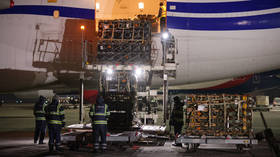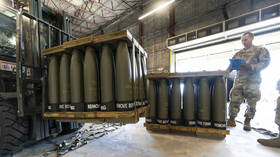Pentagon cites Ukraine aid fraud risks – media

The massive scale of US military aid to Ukraine has reportedly put a Pentagon law enforcement agency on high alert for black market sales of Washington’s weaponry and other potential fraud.
With US aid approvals for Kiev on track to reach $100 billion this year, the Pentagon’s Defense Criminal Investigative Service (DCIS) is watching for signs of misconduct in the ways that weapons are being procured and used, Defense News reported on Wednesday. Fraud concerns stem partly from the Pentagon’s need to sign contracts on a fast-track basis.
“The risk is very real by virtue of the fact that we’re dealing with such an incredible volume of items, many that have warfighting capabilities, and we’re doing it very quickly,” DCIS deputy director James Ives told the media outlet. “Any time where you see accelerated efforts of this nature, there’s potential for all sorts of activities that should be of concern.”
While much of the military aid being sent to Ukraine has been drawn from the US stockpiles, the Pentagon has signed $2.7 billion in contracts for newly built weapons. An additional $6.6 billion in new purchases has been approved by Congress. The Pentagon also has earmarked $6.7 billion to replace supplies sent to Ukraine, half of which has already been spent.
A DCIS team of investigators traveled to Poland in September, where they viewed a key hub for the transfer of military aid to Ukraine, Defense News said. The visit was designed to encourage people involved in the weapons transfers to report possible cases of fraud or diversions.
“A good deal of our efforts right now are making sure we’re out and about, letting folks know that when these facts come to the government’s attention, investigative agencies need to get involved,” Ives said. “It’s an effort to remind folks that although we understand there’s a need to engage in this accelerated procurement that’s going on, there’s a need to bake oversight into the process.”
While some US lawmakers have pressed for stronger oversight, a proposal to audit Washington’s military and economic aid to Ukraine was rejected earlier this month in Congress. CBS News reported in August that only about 30% of the Western weapons sent to Kiev were actually making it to the front lines to help battle Russian forces. Getting weapons to Ukraine’s troops involves navigating a complex network of “power lords, oligarchs [and] political players,” the report said.













